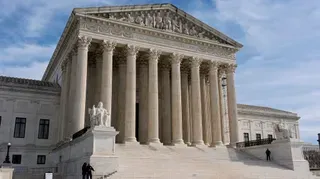February 15, 2008
Romney's unraveling
Michael Wood READ TIME: 7 MIN.
Mitt Romney ended his presidential campaign last week the same way he began it: by gay bashing. In the course of telling the audience at the Conservative Political Action Conference (CPAC) in Washington, D.C. on Feb. 7 that he was stepping aside for the good of the GOP and the country, Romney threw this hunk of red meat to the Republican base: "The development of a child is enhanced by having a mother and a father. Such a family is the ideal for the future of the child and for the strength of the nation. I wonder how it is that unelected judges, like some in my state of Massachusetts, are so unaware of this reality, so oblivious to the millennia of recorded history. It's time for the people of America to fortify marriage through a constitutional amendment, so that liberal judges cannot continue to attack it."
He expressed similar sentiments in his campaign kickoff speech in Dearborn, Mich., one year ago, where he told supporters in the coded language of the "family values" crowd, "I believe the family is the foundation of America - and that we must fight to protect and strengthen it." He added, "I believe that people and their elected representatives should make our laws, not unelected judges."
It's an ironic example of consistency in a campaign that was all but undone by constant charges that Romney was a flip-flopper on gay rights and a handful of other issues, among them abortion, gun control, and the former governor's allegiance to Ronald Reagan.
Sure, there were other problems with Romney's campaign for president: His membership in the Church of Jesus Christ of Latter-day Saints - better known as the Mormon church - was always an obstacle. And he didn't curry much favor when he suggested that his five adult sons were best serving their country by working to elect him to the White House, as opposed to fighting the war on terror by joining the military. His propensity for what Steven Colbert calls "truthiness" also raised questions about his credibility, such as when he told a voter he was a lifelong hunter when in reality Romney had been hunting just twice in his life, or when he insisted that he had no ties to Washington lobbyists when in fact two of his close campaign advisers were Washington lobbyists.
But the flip-flopper tag became an indelible part of the Romney narrative. In a Feb. 8 story about Romney's withdrawal from the race, the Detroit Free Press noted, "From the start, Romney's biggest problem was his political past. ... A Mormon, Romney won the race for Massachusetts governor in 2002, serving one term before running for president. Many of his opponents this year charged that his former moderate positions on abortion and gay rights in Democratic-heavy Massachusetts changed only when he wanted to run nationally and needed to court social conservatives." On the same day, the Baltimore Sun wrote that, "Romney was dogged by charges that he switched positions for reasons of political expedience on core conservative issues, including abortion and gun control. He governed as a moderate in Massachusetts but swung to the right as a presidential candidate." Likewise, the New York Times reported that, "Mr. Romney's advisers acknowledged Thursday an array of tactical missteps and miscalculations. Perhaps most significantly, they conceded that they had failed to overcome doubts about Mr. Romney's authenticity as they sought to position him as the most electable conservative in the race, a jarring contrast to his more moderate record as governor of Massachusetts. And during the January nominating contests, as his opponents attacked his shifting on issues, polls showed his favorability ratings plummeting."
Romney's flip-flop problem began even before he announced his presidential bid. Shortly after a Bay Windows editorial lambasted Romney for his shifting positions on gay issues, including his written pledge to the Mass. Log Cabin Republicans during his 1994 Senate race that he'd be a more effective advocate on gay rights than his rival Sen. Ted Kennedy, Boston Globe columnist Joan Vennochi referenced the editorial and likened Romney's shift from gay rights advocate to anti-gay-marriage crusader to "turning a ballerina into a right-leaning elephant." Mainstream media outlets like the New York Times then started contacting local Log Cabinites and the Human Rights Campaign looking for a copy of the letter; one soon surfaced courtesy of former Mass. Log Cabin leader and one-time Romney supporter Mark Goshko.
Political analysts who spoke with Bay Windows in December 2006 suggested that Romney would be able to outrun his past statements in support of gay rights, saying it was par for the political course.
"Clearly he's moving to the right very aggressively and he has to. He's got to move over to John McCain's right using what issues he can," said Charlie Cook, author of the Cook Political Report, the influential non-partisan newsletter, at the time. "That's what politicians do, whether you're a Republican or Democrat, a Romney or anybody else. That's what they do and that's what he's doing."
"The truth of the matter is that politicians may take different positions on issues based on political realities," agreed Steffen Schmidt, a political science professor at Iowa State University. "Does that make them bad or cynical or corrupt or whatever? The answer is no. ... That's the nature of electoral politics, is that you have to fine tune and finesse your positions and that's the case with Mitt Romney."
But the analysts apparently underestimated how quickly the story would spread, fueled by national media interest, the right- and left-wing blogospheres and YouTube. Soon after the December Bay Windows story, which detailed a host of strong pro-gay stances Senate candidate Romney laid out during a 1994 interview with the newspaper, hit the streets, CNN contacted the newspaper seeking images of the 1994 Bay Windows cover story to use as visuals for a follow-up piece. The Associated Press and New York Times also did follow-ups. Within a week Romney was defending himself in an online interview with National Review, at which point he backed off his previously stated support for the federal Employment Non-Discrimination Act and his openness to repealing to "Don't Ask, Don't Tell." And he made sure to reiterate his longstanding opposition to same-sex marriage. He dismissed the resurrection of his past pro-gay statements, saying, "These old interviews and stories have frequently been circulated by my opponents ever since I took a stand against the Massachusetts supreme-court ruling on same-sex marriage. This being the political season, it is not surprising this old news has appeared again."
By the time of Romney's official entry into the race, in February 2007, the damage was done. Following his announcement MSNBC's conservative commentator Tucker Carlson did a broadcast titled, "Will Romney's flip-flopping kill his chances in 2008?" during which then-Boston Herald columnist and fellow Republican Ginny Buckingham testified to Romney's more moderate positions on gays and abortion during his governorship.
And YouTube became home to a glut of video footage of Romney pledging unwavering support for abortion in 1994 and 2002, expressing his belief that all people should be able participate in the Boy Scouts "regardless of their sexual orientation," and insisting that he did not want to return the country to the era of "Reagan/Bush." Some of the footage and Romney's past statements were fashioned into amateur political advertisements, such as the one set to the Sex Pistols' song "Liar!" which juxtaposes a quote from the infamous Log Cabin letter with one of his more recent statements opposing same-sex marriage.
As late as last September, The New York Times ran a story headlined "Romney's Tone on Gay Rights Is Seen as Shift," which detailed his 2002 meeting with the Mass. Log Cabin Republicans where he reportedly pledged not to champion a fight against same-sex marriage as governor.
Romney's former Log Cabin allies also had some political payback for Romney. In October, the national Log Cabin Republicans ran ads in Iowa and nationally on Fox News highlighting Romney's switches on abortion, gun rights and his opinion of Reagan. In November they aired radio ads in New Hampshire, highlighting his "Mitt-Flops" on tax and fee hikes as governor of Massachusetts.
In an interview with NPR's Morning Edition after Romney dropped out of the race last week, his campaign's policy chairman, former Minnesota Congressman Vin Weber, conceded that Romney's image as a flip-flopper "dogged him throughout the campaign." He went on to gripe that the image "was developed all out of proportion by his political opponents and frankly by some folks in the news media. There's no question it hurt him. I don't think that he anticipated it was going to come at him as hard as it did because in his own mind that was not true."
Such complaining seems like so much sour grapes now. Romney had more to run on than manufactured conservativism - his business background and his turnaround of the Olympics, for instance.
Ultimately, Romney fell victim to his own party's scorched earth campaign tactics. So Goes the Nation, a documentary film about the tight 2004 presidential race in the swing state of Ohio, detailed how effectively Republicans branded John Kerry a flip-flopper for his nuanced position on gay marriage, among other of his shifting positions. A montage of footage from the campaign trail shows groups of Bush supporters endlessly chanting "flip-flop" at various Kerry events with a bulging-vein intensity that is at once hilarious and unnerving.
Romney himself bought into that act at the 2004 Republican National Convention in New York, delivering a speech where he smugly noted that Democratic nominee John Kerry "voted no on Desert Storm in 1991 and yes on Desert Shield today. Then he voted no on troop funding, just after he had voted yes. He's campaigned against the war all year, but says he'd vote yes today. I don't want presidential leadership that comes in 57 varieties! I want a strong president who stands his ground."
So, apparently, do the rest of American voters. Mitt Romney learned that the hard way.
Michael Wood is a contributor and Editorial Assistant for EDGE Publications.







